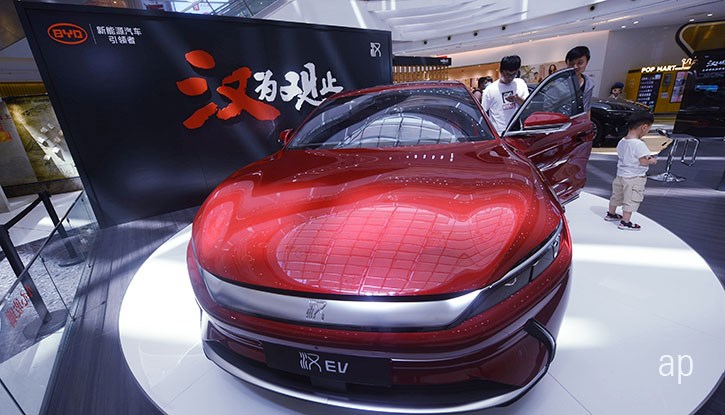
For our ESG week, we have looked at our disruptors series through the lens of sustainability. While many listed companies are now keen to boast of their environmental credentials, we are focusing on leaders who “walk the walk”, in areas as diverse as air conditioning, building insulation and electric cars.
Whether it's a company disrupting an established industry or one that is trailblazing by investing heavily in a disruptive technology with environmental benefits, there are plenty of disruptors out there making a positive impact on the world:
Electric Vehicles (EV)
The runaway success of US firm Tesla (TSLA) in the EV market can distract investors from the strong progress made by Chinese companies in this sector. Warren Buffett’s Berkshire Hathaway (BRK.B) has taken a 25% stake in Shenzhen-based BYD (002594), for example, which makes battery-powered cars, buses and bikes. Meanwhile, lithium ion battery maker Contemporary Amperex Technology (300750) has signed a deal with Tesla to produce a battery that can run for more than a million miles.
China Evergrande (0333)
Morningstar Rating: 3 Stars/No Moat
Year to Date Return: 3.16%
Share Price: HKD$22.85
Morningstar Fair Value Estimate: HKD$19
This property developer has diversified into electric vehicles with the aim of becoming not only China’s answer to Tesla, but the biggest EV manufacturer in the world. Its first electric model, the Henchi 1, is expected to be unveiled this year, with production planned in 2021. Morningstar analyst Phillip Zhong cautious about the company’s near-term prospects, however, especially given the costs involved in building EV cars – the company spent nearly $3 billion in 2019 on EV – not to mention the intense competition from established carmakers and from Tesla.
Building Insulation
Making homes and offices more energy efficient was one of the key measures in the UK Government’s Summer Statement, with cash incentives worth thousands of pounds on offer to homeowners to upgrade their insulation. The Green Homes Grant is being brought forward to start this year with the aim of upgrading 600,000 homes and help the UK meet its aim for net zero carbon emissions by 2050.
With so much money flowing into the space, these measures could be a major boon for businesses. Jonathan Maxwell, manager of the SDCL Energy Efficiency Income trust (SEIT), says upgrading buildings to make them greener to be a strong growth area in the coming years, as well as creating jobs when economies are struggling.
BASF (BAS)
Morningstar Rating: 4 Stars/Narrow Moat
Year to Date Return: -25%
Share Price: €51
Morningstar Fair Value Estimate: €63
Germany’s BASF is a world leader in chemicals and is now using this expertise to make lighter, more energy efficient insulation for buildings. While its first thermal insulation product was launched back in 1951, the firm now offers project management for property developers to help measure and improve the sustainability of their projects. BASF is also turning its attnetion to emerging markets, where the energy efficiency of new buildings is an urgent concern.
Aircon and Refrigeration
In the battler to reduce car and airline emissions, the contribution of air conditioning and refrigeration to climate change is often overlooked. That's despite the fact that aircon makes up 70% of Saudi Arabia’s annual energy demand, as just one example. With climate change increasing global temperatures, the strain on aircon and cooling systems is likely to become even more intense in the coming years. Again, technology may provide the answer for existing companies to improve their products.
Daikin Industries (6367)
Morningstar Rating: 1 Star/No Moat
Year to Date Return: 23%
Share Price: ¥19,080
Morningstar Fair Value Estimate: ¥11,400
Japan’s Daikin may not be a household name but is one of the largest heating, ventilating, and air conditioning (HVAC) companies in the world, having expanded into the US and Chinese market in recent years. It’s already using a new refrigerant called R32 in its residential air conditioners, which has a significantly smaller carbon footprint than traditional gases. Daikin makes up more than 5% of the portfolio of Aberdeen Japan Investment Trust (AJIT), which has a Morningstar Analyst Rating of Bronze.
Insurance with a Conscience?
The Association of British Insurers’ latest report reveals that there were nearly 500,000 fraudulent insurance claims in the UK in 2018. Multiply that globally and add in coronavirus claims, and it’s clear the industry faces significant challenges - and that usually means higher premiums for customers. One company aims to challenge this with a new model, and is targeting the “S” or social part of ESG by appealing to people’s better natures.
Lemonade (LMND)
Morningstar Rating: n/a
Year to Date Return: 144% (since July 2020 IPO)
Share Price: $75
Morningstar Fair Value Estimate: n/a
Insurance disruptor Lemonade has just floated in New York and the shares are already up 144%. It has changed the payment and profits model of traditional insurance – meaning that any money left over after claims are settled is instead given to charity. Using nudge theory to reduce insurance fraud is a bold move and one that has yet to be tested over the long-term, but one would hope that insurance customers are less likely to defraud a charity than a giant insurance corporation.




























